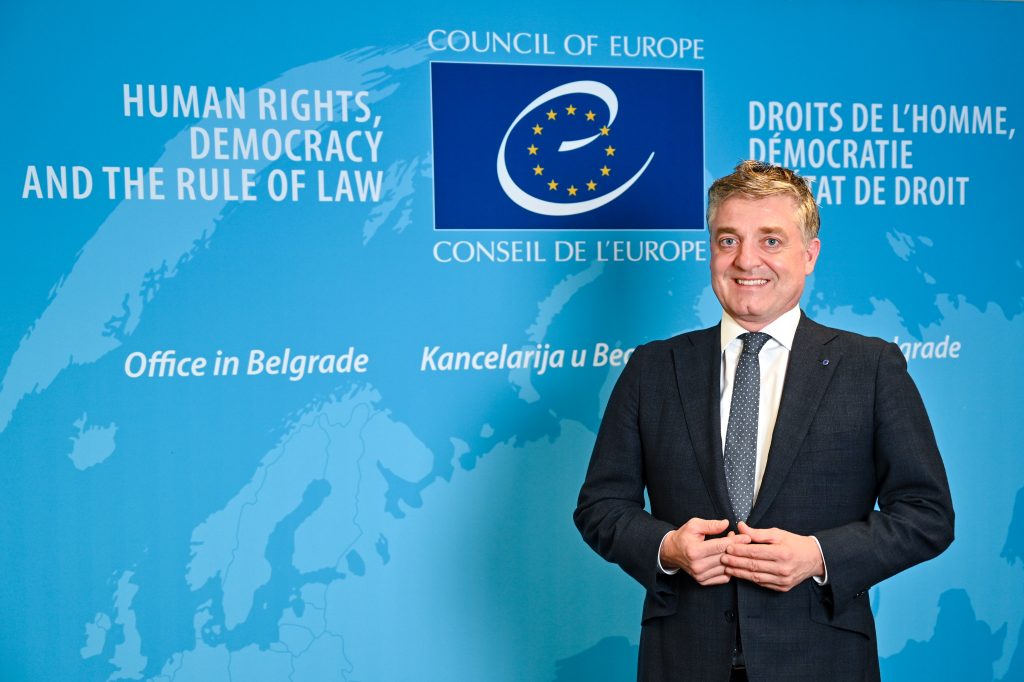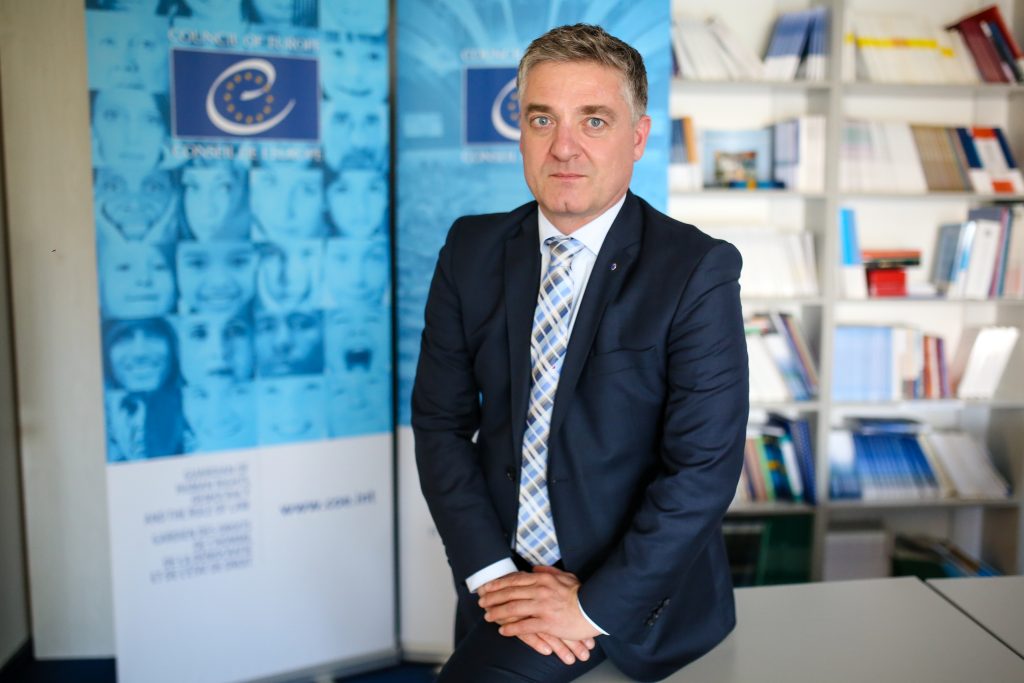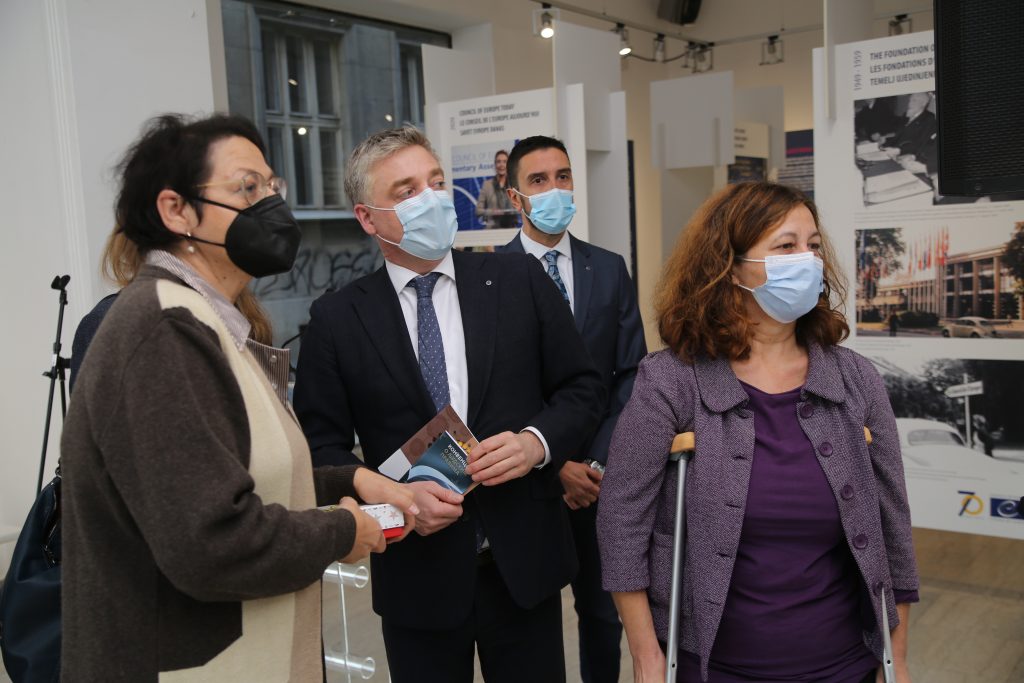I am proud that the Council of Europe has continued to stand for a democratic society, with all the ups and downs of the past 14 months
The Council of Europe Office in Belgrade was opened by the then Secretary General Walter Schwimmer in 2001. Its main activities are aimed at promoting democracy, the protection of human rights and the rule of law. We talked with Tobias Flessenkemper, Head of the Council of Europe Office in Belgrade, about the last 20 years of work and many realized projects. As well as how he sees the relation between the Council of Europe and Serbia.

The Council of Europe’s office in Belgrade was opened on March 16, 2001. How would you rate the cooperation between Serbia and the Council of Europe all these years?
When the Council of Europe decided to open an office in Belgrade it was set up to work both in Montenegro and Serbia, then both part of Federal Republic of Yugoslavia which had applied for membership in the Council of Europe at the end of 2000. The State Union of Serbia and Montenegro then became our 45th member state in April 2003. Later, they became independent countries, and Montenegro joined again in 2007. During this momentous phase, the Council of Europe office in Belgrade facilitated the work on the new Constitution of Serbia, adopted in 2006, and laws on many other aspects of the reform, from the protection of national minorities to local self-government, from fighting discrimination to fostering the autonomy of the judiciary. Over time, Serbia has become a committed member-state of the Council of Europe, actively participating in the work of all of its bodies, including in the Parliamentary Assembly in Strasbourg. This was reflected in our cooperation, which gained a new quality when Serbia became a candidate for EU membership in 2012.
Both the EU and the Council of Europe agreed in 2007 that Council of Europe, its principles and standards will remain the benchmark for human rights, the rule of law and democracy in Europe. They are first and foremost important for people in Serbia who want to fully exercise their fundamental rights and freedoms. The co-operation within the Council of Europe has helped citizens, Parliament and the government to make this objective a living reality. To illustrate these achievements and to mark the 20th anniversary of our office with, we will hold a series of events throughout 2021.
In such difficult times, human rights remain as important as ever
The Council of Europe has implemented numerous projects in Serbia. Which ones would you like to single out?
The “Living Library” project jumps to mind. I have learned about this idea implemented in other countries, and it has been a great success in Serbia. The Living Library works like an ordinary library: readers come and borrow a “book” for a limited period of time. The difference is that the “books” in the Living Library are actually people, human beings who enter into a personal dialogue with the readers. The “books” in the Living Library represent groups frequently confronted with stereotypes, who are often victims of discrimination, prejudice or social exclusion. It is a beautiful project that helps to challenge prejudice and discrimination, to experience first-hand that discrimination is more than a theory, and to understand that fighting it is not a matter of ideology, but of real lives of real people who suffer from it. We hope to launch it again as we are supporting Serbia to reform its anti-discrimination legislation.
Our common goal is to ensure equal rights and respect for persons belonging to national minorities, including Roma; people affected by disability; lesbian, gay, bisexual, transgender and intersex persons; socially marginalized people, who experience difficulties in accessing their political, economic, social and cultural rights: all of them should be able to safely, consistently and fully enjoy their fundamental rights and freedoms, and hate speech against should be countered. This message also runs like a golden thread through the report on hate speech in the media in Serbia we have launched in April 2021. Too often do we face incitement of xenophobia, racial hatred, antisemitism, islamophobia, anti-gypyism and intolerance in the public discourse. It targets many groups – national minorities, immigrants, women and LGBTI people. That’s why we launched, together with the European Union, the joint campaign Block the Hatred, Share the Love (BHSL). I invite you to join us alongside personalities such as the singer Sara Jo who volunteered to become a BHSL-Ambassador in the Western Balkans region.

The main activities of the Council of Europe are aimed at improving democracy, protecting human rights and the rule of law. How much do you think these areas are developed in Serbia and what still needs to be improved?
Let me use the example of protecting human rights. The Council of Europe started with setting standards: the European Convention on Human Rights outlining these standards was signed in 1950. However, one of the lessons from the first half of the 20th century was standards alone mean little if their application is left entirety to the discretion of the states, not followed up and monitored. That’s why already in the Convention a process to control the implementation of the human rights standards by European states was foreseen. Our most well-known and most important monitoring mechanism is undoubtedly the European Court of Human Rights, the Strasbourg Court. The results of its “monitoring” are basically its judgements which identify gaps, propose ways for bridging them and together form the case-law on which national courts of all other European states can rely in their work. For instance, here in Serbia important work is being done to execute the European Court’s judgment on the so-called “missing babies” case which concerns the disappearance of the applicants’ newborn children in state-run maternity wards in the 1980’s.
Serbia continues to work on the execution of judgments in the European Court, but by the end of 2020, Serbia was still to fully implement 33 judgments. The number of new complaints arriving at the Court is also an indicator of the human rights situation in the country. It is no secret that the number of cases from Serbia remains rather high, in absolute and proportional terms: in 2020, the Court in Strasbourg has received some 1,800 new applications against Serbia. The work of democratic institutions is very much the focus of the Parliamentary Assembly of the Council of Europe, another important part of our organisation. In January 2021 the Parliamentary Assembly has request an opinion of the Venice Commission on the constitutional and legal framework governing the functioning of democratic institutions in Serbia. The Venice Commission, our expert and advisory Commission for Democracy through Law, will present its analysis of the situation later this year.

How much has the coronavirus pandemic affected your goals and plans last and this year? How did you adjust your projects to the new circumstances?
The pandemic has affected Europe in an unprecedented manner. Immediately, in March 2020 we applied all precautionary measures. Most of our usual activities, such as public events, conferences, seminars, workshops with many governmental and non-governmental partners in Serbia were put on hold. Through 2020 we sought to maintain access for everyone to the information about the Council of Europe’s work in more innovative ways through the internet. The consequences of the pandemic and the related crisis for the society, democracy, culture, the rule of law, economy and European co-operation are shaping our lives and work today and well into the future. In such difficult times, human rights remain as important as ever. I am proud that the Council of Europe has continued to stand for a democratic society, with all the ups and downs of the past 14 months, and I am more than ever convinced that the aims of international cooperation and European unity must be our guiding principles in Serbia and elsewhere, to overcome the effects of the pandemic together
It is no secret that the number of cases from Serbia remains rather high
You have been the head of the Council of Europe mission in Belgrade since 2018. What are your impressions of Serbia? How do you feel living here?
My time, my life in Belgrade has been cut in two parts: “before” and “during” the pandemic. I was lucky to have one and half years to move around freely and get to better know the country before the lockdown in March 2020. This first period is full of memories that I cherish. In Turija, I visited the elementary school Veljko Dugošević and had the privilege to discuss with the children and young people their lives and their participation in our project developing competencies for democratic culture. In Niš, I met with the Roma community members, and we reflected how improving their rights will help the city to prosper. In Novi Sad, I had the opportunity to meet the Mayor an exchange ideas about the value of cultural heritage for society and their preparations for the European Capital of Culture.
In Novi Pazar, we launched our project on improving human resource management in local authorities and I also had the opportunity to meet with the Bosniak National Council and learn more about the multinational and multicultural nature of Serbia. In October 2019, I spoke at the opening of the Conference of Judges, which also gave me an invaluable opportunity to explore Vrnjačka Banja and its inspiring surroundings. In Belgrade, I have been enjoying the cultural live, which unfortunately was hit so hard by the COVID19. I am very much looking forward to attending again concerts at the Kolarac, a place which I find particularly enchanting because of its significance and the many interesting activities usually taking place there – activities showing the diversity and beauty of lives and people in Serbia.